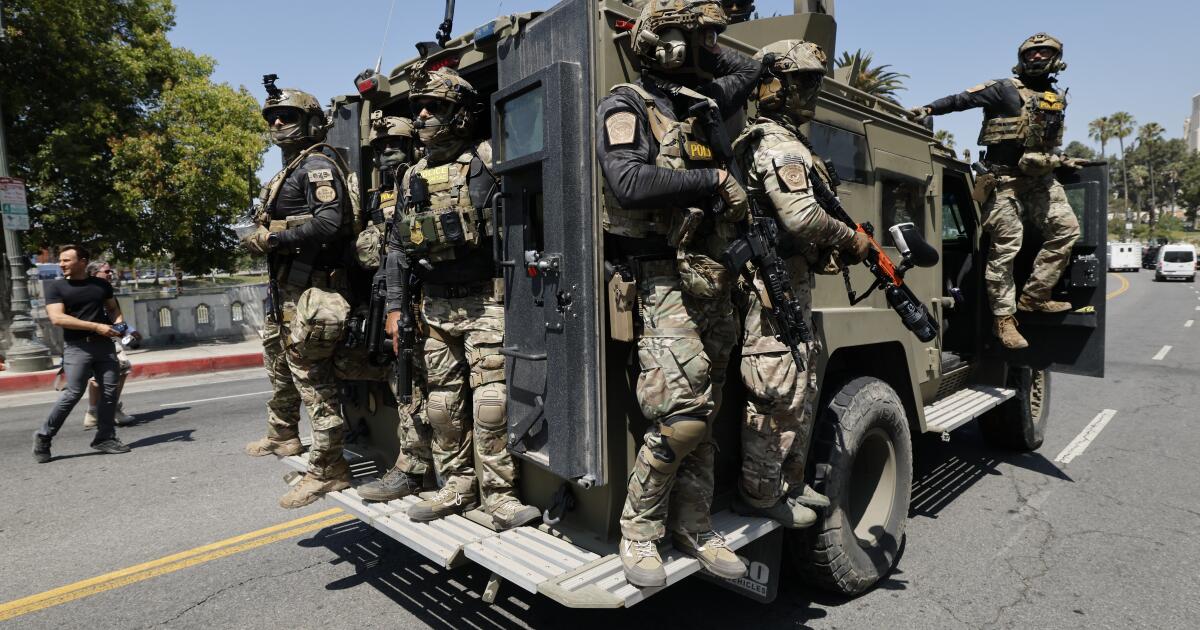The Trump administration on Thursday petitioned the Supreme Court to free up its mass deportation efforts across Southern California, seeking to lift a ban on “roving patrols” implemented after a lower court found such tactics likely violate the 4th Amendment.
The restrictions, initially handed down in a July 11 order, bar masked and heavily armed agents from snatching people off the streets of Los Angeles and cities in seven other counties without first establishing reasonable suspicion that they are in the U.S. illegally.
Under the 4th Amendment, reasonable suspicion cannot be based solely on race, ethnicity, language, location or employment, either alone or in combination, U.S. District Judge Maame Ewusi-Mensah Frimpong of Los Angeles found in her original decision.
The Trump administration said in its appeal to the high court that Frimpong’s ruling, upheld last week by the 9th Circuit Court of Appeals, “threatens to upend immigration officials’ ability to enforce the immigration laws in the Central District of California by hanging the prospect of contempt over every investigative stop.”
Lawyers behind the lawsuits challenging the immigration tactics immediately questioned the Trump administration’s arguments.
“This is unprecedented,” said Mark Rosenbaum of Public Counsel, part of the coalition of civil rights groups and individual attorneys challenging cases of three immigrants and two U.S. citizens swept up in chaotic arrests. “The brief is asking the Supreme Court to bless open season on anybody on Los Angeles who happens to be Latino.”
The move comes barely 24 hours after heavily armed Border Patrol agents snared workers outside a Westlake Home Depot after popping out of the back of a Penske moving truck — actions some experts said appeared to violate the court’s order.
If the Supreme Court takes up the case, many now think similar aggressive and seemingly indiscriminate enforcement actions could once again become the norm.
“Anything having to do with law enforcement and immigration, the Supreme Court seems to be giving the president free rein,” said Eric J. Segall, a professor at Georgia State University College of Law and a prominent scholar of the country’s highest court. “I think the court is going to side with the Trump administration.”
The Department of Justice has repeatedly argued that the temporary restraining order causes “manifest irreparable harm” to the government. Officials are especially eager to see it overturned because California’s Central District is the single most populous in the country, and home to a plurality of undocumented immigrants.
In its Supreme Court petition, the Justice Department alleged that roughly 10% of the region’s residents are in the U.S. illegally.
“According to estimates from Department of Homeland Security data, nearly 4 million illegal aliens are in California, and nearly 2 million are in the Central District of California. Los Angeles County alone had an estimated 951,000 illegal aliens as of 2019 — by far the most of any county in the United States,” the petition said.
President Trump made mass deportations a centerpiece of his 2024 campaign, and has poured billions in federal funding and untold political capital into the arrest, incarceration and removal of immigrants. Though Justice Department lawyers told the appellate court there was no policy or quota, administration officials and those involved in planning its deportation operations have repeatedly cited 3,000 arrests a day and a million deportations a year as objectives.
District and appellate courts have stalled, blocked and sometimes reversed many of those efforts in recent weeks, forcing the return of a Maryland father mistakenly deported to Salvadoran prison, compelling the release of student protesters from ICE detention, preserving birthright citizenship for children of immigrant parents and stopping construction of “Alligator Alcatraz.”
But little of the president’s immigration agenda has so far been tested in the Supreme Court.
If the outcome is unfavorable for Trump, some observers wonder whether he will let the justices limit his agenda.
“Even if they were to lose in the Supreme Court, I have serious doubts they will stop,” Segall said.

